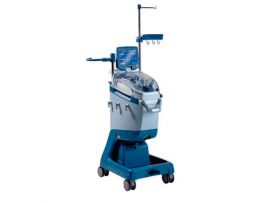Abstract This study described the outcomes of patients receiving topical, nebulized, endobronchial, or systemic tranexamic acid (TXA) for bleeding events while on extracorporeal membrane oxygenation (ECMO). We performed a single-center..
Read MoreAbstract Background Sex differences present in the blood management of patients after coronary artery bypass grafts (CABG) surgeries. Tranexamic acid (TXA) performed well in maintaining hemostasis during and after surgeries...
Read MoreAbstract Importance Tranexamic acid is recommended for reducing blood loss and transfusion in cardiac surgery. However, it remains unknown whether a high dose of tranexamic acid provides better blood-sparing effect than..
Read MoreAbstract Objectives To examine the (PK) and of a tranexamic (TXA) regimen designed for cardiac surgery with (CPB). Design A pilot study quantifying TXA concentrations, markers, and a plasmin- generation (PG) assay. For comparison,..
Read MoreAbstract Purpose To develop evidence-based clinical practice recommendations regarding transfusion practices and transfusion in bleeding critically ill adults. Methods A taskforce involving 15 international experts and 2 methodologists used the..
Read MoreAbstract Objective To evaluate the effects of administering tranexamic acid (TXA) after cardiopulmonary bypass, instead of after anesthesia induction, on postoperative seizures and blood transfusion requirements. Methods Adult patients who..
Read MoreAbstract Major surgery induces hemostatic changes related to surgical stress, tissue destruction, and inflammatory reactions. These changes involve a shift of volume from extravascular space to intravascular and interstitial spaces,..
Read MoreAbstract Importance Tranexamic acid (TXA) is an efficient antifibrinolytic agent; however, concerns remain about the potential adverse effects, particularly vascular occlusive events, that may be associated with its use. Objective ..
Read MoreAbstract Background Coagulopathy is a major problem in surgery for cyanotic congenital heart disease. Tranexamic acid has been used both topically and systemically and plays a vital role in pediatric..
Read MoreAbstract BACKGROUND Tranexamic acid reduces the risk of bleeding among patients undergoing cardiac surgery, but it is unclear whether this leads to improved outcomes. Furthermore, there are concerns that tranexamic..
Read MoreAbstract Background Open heart surgeries under cardiopulmonary bypass are associated with excessive perioperative bleeding that often requires reoperation. Antifibrinolytics like epsilon aminocaproic acid and tranexamic acid are widely used to..
Read MoreAbstract Tranexamic acid reduces blood loss and transfusion requirements with no significant thrombotic adverse effects. Postoperative seizures have been seen in cardiac surgical patients in association with patient (advanced age,..
Read MoreAbstract OBJECTIVES: The upcoming release of aprotinin in paediatric cardiac surgery prompted a re-evaluation of its use in comparison to tranexamic acid (TXA) focusing on their effect on exposure to..
Read MoreAbstract BACKGROUND: Tranexamic acid (TXA) is a common antifibrinolytic agent used to minimize bleeding in cardiac surgery. Up to 50% cardiac surgical patients have chronic renal dysfunction (CRD). Optimal dosing..
Read MoreAbstract There is evidence that, in adult cardiac surgical patients undergoing on-pump procedures, tranexamic acid (TXA) dose-dependently increases the risk of convulsive seizure (CS). We aimed to investigate whether a..
Read MoreAbstract In cardiac surgical patients, tranexamic acid (TXA) has been associated with an increased risk of convulsive seizure (CS). We aimed to investigate whether in patients undergoing isolated coronary artery..
Read MoreBackground It is unclear whether high-dose regimens of tranexamic acid in cardiac surgery (total dose, 80 to 100 mg/kg) confer a clinical advantage over low-dose regimens (total dose, approximately 20..
Read More





